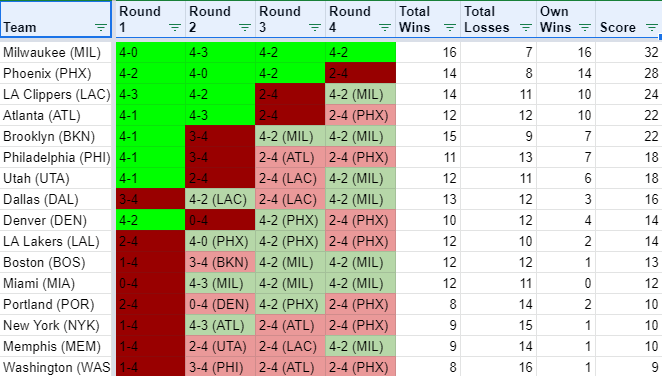Sports Math - Who Lost the Playoffs?
As we get into summer, it's the time of year when two of the big North American sports leagues crown their champions: the National Hockey League (NHL) and the National Basketball Association. But, I have often found myself curious about how the other teams might be ranked.

As we get into summer, it's the time of year when two of the big North American sports leagues crown their champions: the National Hockey League (NHL) and the National Basketball Association (NBA). And as sports fans, we're also blessed this summer with the Euro 2020 Football (or soccer) Championships.
Both the NHL and the NBA follow a fairly standard playoff journey, with 16 teams qualifying, and through a number of best of seven series, getting whittled down to 8, 4 and 2 teams before naming a champion.

Mathematicians may recognize that this is similar to an approach for finding the maximum (or minimum) value in a list of array. Compare two numbers, discard the smaller one, and repeat until you have the maximum.
This is a great way of determining a champion, but I have often found myself curious about how the other teams might be ranked. The Tampa Bay Lighting were the Stanley Cup Champions this year, and while they beat the Montreal Canadiens in the final, that doesn't necessarily mean that Montreal was the second strongest team. For example, Tampa beat the Florida Panthers in the first round. Maybe the Panthers would have been able to beat every other team in the playoffs, but had the misfortune of playing the best team in the first round.
Of course, without more teams playing each other, it's impossible to get a complete and definitive list of all of the teams, but I wondered how you might be able to glean some information.
I remember some schoolyard games from elementary school where, once you were eliminated, you promptly joined the team that had eliminated you and moved onto the next round, so that everyone still got to play. What if I treated the playoffs the same way? Once you lost to another team, you took on their record in the next round, and if they lost, you followed the team they lost to in the next round, and so on.
For example, let's look at Boston.
- In the first round, they defeated Washington 4-1.
- In the second round, they lost to New York 2-4, and so they get to take NY's record in the next round.
- In the third round, New York lost 3-4 to Tampa Bay, so Boston gets credit for that 3-4 record, and joins Tampa Bay for the final round.
- And in the finals, Tampa won 4-1, so Boston gets to take that record as well.
Over all four rounds, Boston and their proxies accumulated 13 wins (4+2+3+4) and 10 losses (1+4+4+1). In the table below (also linked here), that is counted as "Total Wins". But of course, a team should receive some extra credit for winning games themselves, rather than having another team win for them ("Own Wins" in the table). Boston ended up with 6 of their own wins. To try and properly account for this, I've given teams double the credit for their own wins, so my final ranking is from the "Score" column (which is Total Wins + Own Wins). In case of a tie, I've given the tiebreaker to the team with more of their own wins.

Looking at the overall rankings, this feels pretty good overall.
The champions are rightfully at the top, followed by some teams that made it pretty far, and lost a competitive series when they did lose. And down at the bottom are two teams that seem to be pretty clearly at the bottom of the heap, St. Louis and Edmonton. Neither team won a game on their own, and both teams regularly had the teams that beat them promptly go on to lose in the next round. Everything's a lot tighter in the middle, but of course, that's what makes for good debate.
If Toronto and Colorado had faced off in a 7 game series for example, who would have won? Who knows, but I'm sure there are some strong opinions!
The NBA playoffs are wrapping up too, so I've pulled some data for the NBA too.


(See the "NBA Results" tab of the linked spreadsheet) I'll update the spreadsheet as the finals continue, but so far, a similar trend is emerging. While Phoenix and Milwaukee go toe to toe for the championship, I'll be watching with bated breath to see the battle between Memphis and Washington to see who will be the ultimate bottom feeder!
***UPDATE: Condolences to the Washington Wizards, your 2021 NBA Playoff Losers!
For a similar, but slightly simpler exercise, I looked at the results for the Euro 2020 soccer tournament, which just crowned Italy as the champion.

The difference between the Euro is that the knock-out stage is a single elimination tournament, rather than a best-of-seven. It's not as easy to differentiate between a team that got blown out compared to a team that lost a close game, so the middle of the pack gets quite bunched up. The overall flow still looks about right though, as sad as it makes me as someone of Dutch heritage to see the Netherlands scratching the bottom of the barrel in the tournament.

